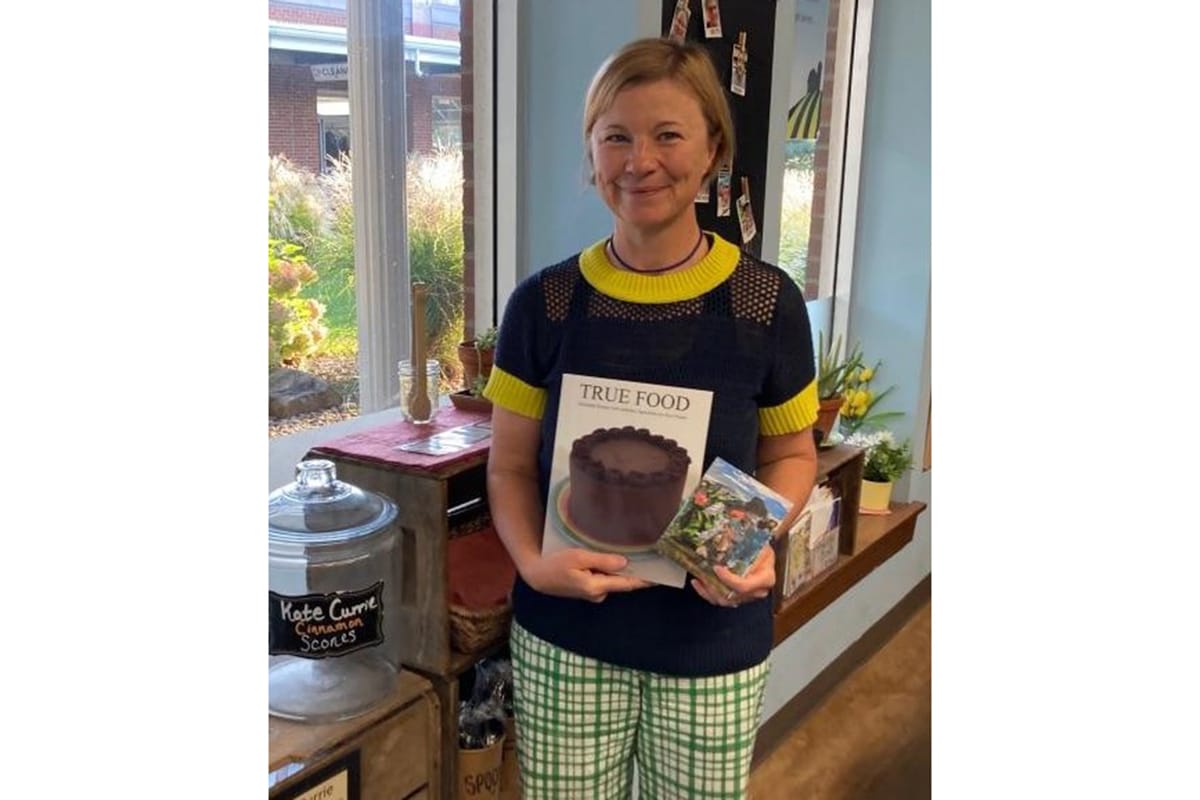Local baker and nonprofit director makes final scone delivery
For years, Kate Currie has regularly dropped off her scones and other baked goods at MOON Co-op to sell to Oxford residents. Last week, she made her final delivery as she pivots to focus on her nonprofit organization.

Kate Currie has been baking scones and other goodies for MOON Co-op Market every Tuesday and Friday for more than 12 years. A few days ago, she made her final delivery. Now, she’ll be devoting more time to her organization supporting immigrants and refugees.
Kate has been a major contributor to making Oxford a special place since arriving here 35 years ago as a student in Miami’s Western College Program, earning a degree in sculpture. Last year, she completed a PhD in Educational Leadership at Miami.
My favorite Kate-created event was the Oxford Kinetics Festival, which she devised while a member of Oxford City Council to celebrate the city’s bicentennial. Dozens of participants created self-powered creations such as a La-Z-Boy recliner welded to a bicycle and a self-powered smoothie machine. Kate was named Oxford’s Citizen of the Year for her leadership in creating the Kinetics Festival.
Kate is co-founder and Executive Director of Maketank, Inc., a nonprofit corporation originally formed to support students to create projects for the Oxford Kinetic Festival. She is currently Director of Maketank’s Illustrated Memoir Project, which engages newly arrived refugee and immigrant high school students learning English as a second language to write and illustrate stories from their lives. Some of these stories are published as books and animations.
The Cincinnati Contemporary Arts Center has an exhibition of 30 works by Kate’s students, open Sept. 14 through Nov. 10, titled “Illustrated Memoir Project, Knowing Ourselves, Understanding Each Other.” Many of Kate’s friends in Oxford plan to attend the exhibition’s opening reception at the museum on opening day.
Let’s get back to the subject of scones. In the United Kingdom, especially in Scotland, scones are a fixture with afternoon tea, normally served with jam or clotted cream. British scones are made with less butter than American ones, and the butter is mixed at room temperature.
Concerning pronunciation, in the United States “scone” rhymes with “tone” as if spelled “skoan.” In the United Kingdom, especially in Scotland, it rhymes with “dawn” as if spelled “skawn.”
Kate Currie’s scone recipe appears in a cookbook she authored, “True Food.” I use a simpler recipe to turn out adequate scones, if not exceptional like Kate’s.
Generously grease and flour a cookie sheet or cut parchment paper to fit. Combine 1 cup flour, 2 teaspoons baking powder, 1/4 teaspoon salt, and 2 tablespoons sugar. Add 1 tablespoon of room temperature butter and mix with your fingers until the mixture has a sandy texture like fine breadcrumbs.
Add 1/3 cup milk to the dry ingredients. Use your fingers to mix the dough until all the lumps are gone. The dough will be quite sticky.
Place the dough on a well-floured surface. Sprinkle flour on top of the dough and knead 2 or 3 times to coat it with flour. Shape the dough into a 1-inch thick round.
Use a well-floured cookie cutter or glass to cut the dough into 1½-2 inch circles. Place the rounds on the cookie sheet. Combine the scraps to form rounds. You should have 4 or perhaps 5 scones.
Break an egg in a bowl and brush the tops of the rounds. Bake at 425 for around 15 minutes.
Many folks in Oxford will miss their weekly “Kate scone fix.” Baking scones twice a week for more than 12 years has been a remarkable feat. Thank you Kate, and best of luck accomplishing other remarkable feats.
James Rubenstein is president of the Board of Directors for the Oxford Free Press and professor emeritus of geography at Miami University.




